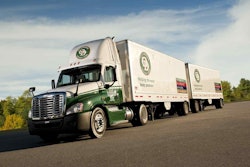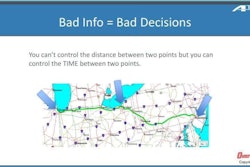Action on the truck size and weight debate is not as certain as death and taxes but, like them, always hovering.
This year’s version, the Safe, Flexible and Efficient Trucking Act, proposed by U.S. Rep. Reid Ribble of Wisconsin, would allow 91,000-pound rigs with six axles. SAFE is a standalone bill, though there’s been talk of it or something similar going into the highway reauthorization bill.
 Damage to roads and bridges is one concern in the debate over heavier trucks.
Damage to roads and bridges is one concern in the debate over heavier trucks.Two of the proponents’ primary arguments hinge on the addition of a sixth axle:
- It is axle weight, not gross weight, that causes road and bridge damage. The 91,000-pound truck with six axles has less weight per axle than an 80,000-pound truck with five axles.
- Even with the extra weight, the bigger trucks could stop better with the added braking power of the extra axle.
- Bigger trucks burn more fuel, but the added freight more than compensates. Overall, fuel costs and emissions would drop.
- Because bigger trucks offer higher productivity, their use would help lessen congestion and relieve some of what fleets say is a driver shortage.
Here are some of the arguments against allowing heavier trucks:
- Owner-operators and the smallest fleets are not in a position to buy new trailers and stay competitive with big fleets. Even for big fleets, the upgrade costs would “yield little to no return,” says the Truckload Carriers Association, a sentiment echoed by Werner Enterprises COO Derek Leathers.
- Heavier trucks, even with the extra axle, could accelerate damage to highways and bridges that already have deteriorated too much due to decades of inadequate highway funding. A study this year found that more than 61,000 U.S. bridges are “structurally deficient.”
- Increasing the number of 80,000-plus-pound trucks would automatically create a higher incidence of safety violations. The Owner-Operator Independent Drivers Association argues “that trucks carrying more than 80,000 pounds have 20 percent more brake violations as well as overall higher violations – including out-of-service violations – when compared to trucks at or below current weight limits.”
- Extra braking power wouldn’t make any difference in the small number of accidents, notably head-on collisions, where a fatigued trucker or four-wheeler never brakes. In such cases, the additional truck weight would only worsen the injury/fatality toll.
On June 5, the Department of Transportation released technical results from the Federal Highway Administration’s Comprehensive Truck Size and Weight Limits Study. The conclusion was that too little data exists on size and weight risks and infrastructure concerns to raise the current limits.
Given the opposing arguments, that conclusion is valid. When safety is at stake, there’s no need to take needless risks in the name of uncertain efficiency.
What’s your take on heavier trucks? Comment below.










